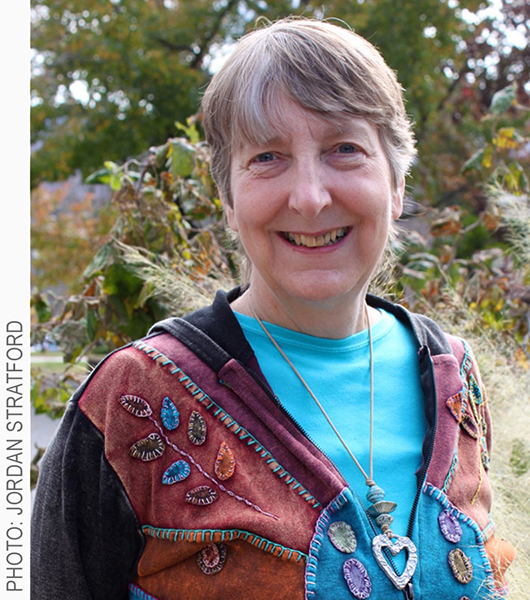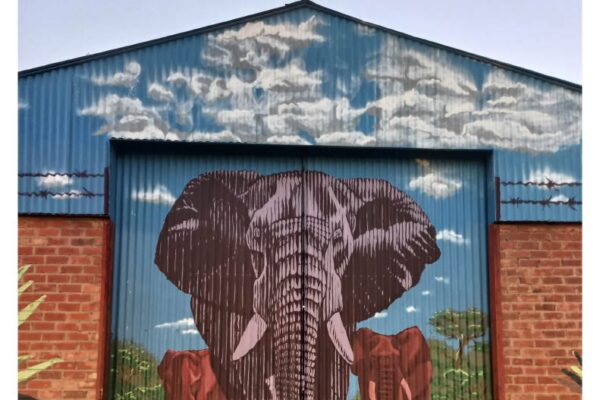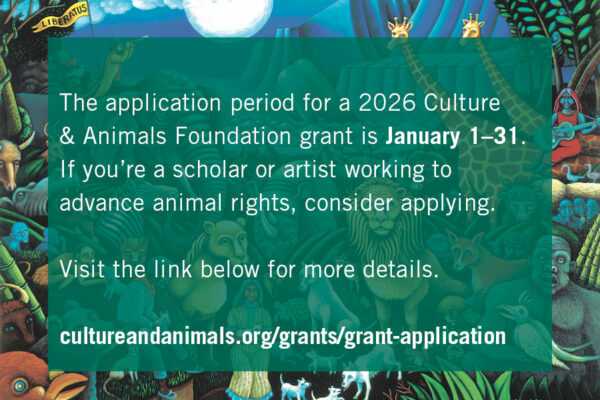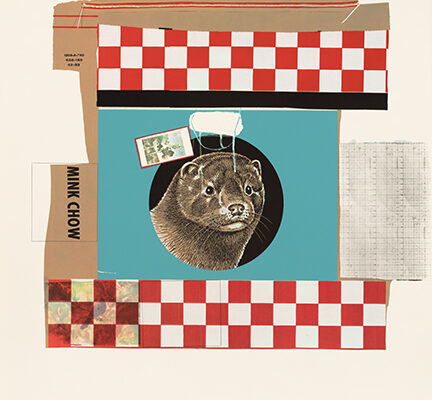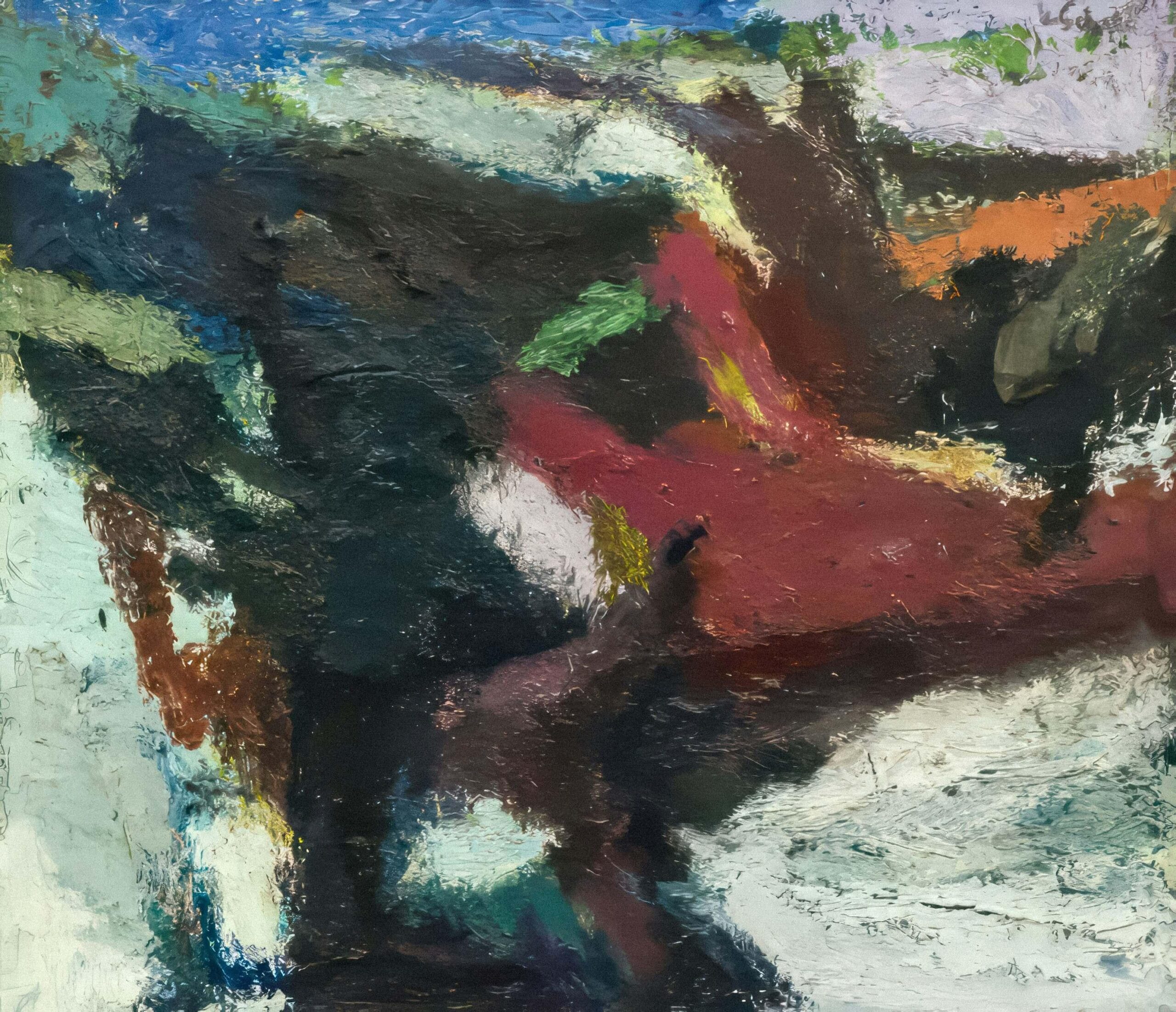Carol J. Adams is the author of numerous books on the intersections between meat eating and misogyny, including the pioneering and deeply influential The Sexual Politics of Meat: A Feminist-Vegetarian Critical Theory, as well as The Pornography of Meat, and Neither Man Nor Beast: Feminism and the Defense of Animals. She has written extensively on popular culture, meat eating, politics, and lifestyle in books such as Burger, Living Among Meat-Eaters, Protest Kitchen (with Virginia Messina), and Even Vegans Die (with Messina and Patti Breitman). She is the editor or co-editor of several anthologies of philosophy, feminism, and animals, including Ecofeminism: Feminist Intersections with Other Animals and the Earth (with Lori Gruen) and The Feminist Care Tradition in Animal Ethics: A Reader. Information on these titles, and others, can be found on her website: CarolJAdams.com.
In 2018, CAF invited Carol to be the inaugural Tom Regan Memorial lecturer. On September 21, she presented “Animal Rights and Contemporary Politics,” at the department of philosophy and religious studies at North Carolina State University in Raleigh, where Tom had been a professor for 34 years. In this reflection from 2016, Carol recalls what it felt like to receive a grant from the Culture & Animals Foundation, in 1988, for the completion of the manuscript that would become The Sexual Politics of Meat:
I remember opening the envelope and staring at the check for several minutes, thrilled, speechless. By 1988, I had been following the thread of the idea I first had in 1974, fourteen years earlier. At times, it felt like being in the labyrinth with the Minotaur. I was not there to slay the monster, but to understand and describe what I believed about human–animal relationships. Knowing what I wanted to say, and knowing how to say it, are two different things entirely. And as I wandered in the maze of ideas, I often dropped the thread and lost my way.
By 1988, I had written three very different drafts of my manuscript. But I was very excited because the most recent draft reflected the revelation I had experienced, about how animals and women were absent referents in a patriarchal culture. This insight was the thread that seemed to promise a way out of the labyrinth. I knew what I had to say; I now knew how to say it.
The chapter in which I introduce the concept of the absent referent is one of the chapters I submitted to the Culture & Animals Foundation in my application for a grant. Not too long after, I received a letter from Melinda Vadas. She had been asked to evaluate the chapter by Tom and Nancy, and she was writing to congratulate me on the chapter and to share some of her thoughts from her own philosophical work.
I guess it’s okay to admit in public to Tom and Nancy and others, this letter was the first to arrive. Melinda’s enthusiasm was such a wonderful sign. At that moment, what it said to me was that I was on the right path. My ideas had touched a stranger, who was responding to them. Melinda and I would correspond for many years. Her quote—“Meat is like pornography; before it was someone’s fun, it was someone’s life”—is the epigraph to The Pornography of Meat.
A few days later, the check from the Culture & Animals Foundation and a letter from Tom arrived. The unbelievable had happened. This was a respected foundation, and a famous philosopher was writing to me about my work and giving me money as well. For several days I did not cash the check; instead, each day found me simply staring at it, encouraged by its sight. With the funds from the Culture & Animals Foundation, I covered the cost of a research trip to Austin, to the Harry Ransom Center at the University of Texas, to read Joseph Ritson’s 1802 book, An Essay on Abstinence from Animal Food as a Moral Duty—and which I discuss in Chapter 5 of The Sexual Politics of Meat.
I was only about one-fourth of the way through the book in the library by the end of the day. It was catalyzing so many thoughts I had to stop and write notes about it all the time. But I did not have the time to stay for an extra day at the center. So I splurged and ordered a microfilm copy, and once home, took a lot of quarters to Southern Methodist University’s library, where you could print out microfilm one page, one quarter, at a time. And I would, and I could, because I now had a research budget.
I am thankful for the Culture & Animals Foundation’s generosity in supporting me. The grant helped me with my next steps in completing my manuscript. But, even more importantly, I am grateful for their witness, their encouragement, their confirmation that I had found my way. A year later, The Sexual Politics of Meat won a women’s studies award from Continuum Publishing Company and at the end of 1989 it was published. I was out of the labyrinth.
The Culture & Animals Foundation is delighted to include Carol Adams on its advisory board. Carol’s work over the last thirty years has contributed enormously to expanding philosophical and cultural engagement within feminist studies, gender studies, environmental studies, religious studies, and critical animal studies, and at the intersections of these disciplines. Her scholarship is always challenging, engaging, and enlivening; her commitment to theory and praxis is illustrative of CAF’s work in deepening understanding and communicating beyond the academy and the intellect to the heart of society.
